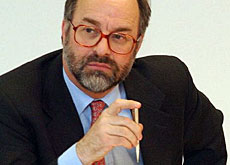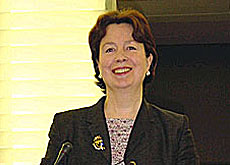Diplomat calls for closer ties with EU

A Swiss diplomat says Switzerland must continue negotiations with the European Union now that the two sides have signed a second series of bilateral accords.
Dante Martinelli, who has spent the past five years in Brussels as head of the Swiss Mission to the EU, told swissinfo the momentum must be sustained.
Martinelli, who has just stepped down from his post in Brussels, conceded that the bilateral route was not easy.
But he said this was the approach to the EU that the Swiss people had chosen, as an alternative to membership.
swissinfo: The second set of bilateral accords has been signed and is now in the course of being ratified. Will Switzerland now embark on a new round of negotiations with the EU, or take time out?
Dante Martinelli: We first have to see the second round of bilateral accords implemented. That’s important because these accords will bring economic, financial and security benefits. We have already taken big strides.
Should we call a halt now? I don’t think so. Switzerland and the EU are now working so closely together that it’s inconceivable that we stop now.
The EU is constantly extending its legislation and its activities as well as expanding to include new member states. With such an important partner we can’t just call a halt to negotiations.
swissinfo: But can Switzerland keep on concluding bilateral accords with the EU? Won’t the disadvantages eventually end up outweighing the advantages?
D.M.: It was the Swiss people who decided to follow this bilateral route! To do nothing would be a backwards step. In the dynamic environment of the EU, if a partner stands still the distance grows.
So our goal is to keep the distance between Switzerland and the EU as small as possible, so that eventually it will disappear.
It’s true that the bilateral route is a difficult one. And it will become more and more difficult as we tackle issues that are increasingly hard to settle, for example legal and security issues.
swissinfo: What influence can Swiss diplomats hope to exert in Brussels? With Switzerland outside the EU, how can you follow what is going on in the Council of Ministers or the Commission?
D.M.: We have to keep informed and maintain contacts with the different European institutions while taking on board the fact that they are constantly extending their activities. We have to keep on top of what is happening.
We have to be across all the dossiers and know what affects us. In that way we can compensate to some extent for not being involved in the decision-making.
swissinfo: Has Switzerland’s image improved or is the country still seen as benefiting from the EU without contributing to it?
D.M.: It still has that image, which is becoming a cliché. It is explained by the fact that Switzerland is outside the club yet is trying to win some of the advantages of EU membership.
But the fact is that Switzerland is no different from any other country – EU member or not – which tries to defend its own interests.
swissinfo: The EU has grown from 15 to 25 members. Should Switzerland expect even less understanding from Brussels now?
D.M.: The EU has become more heterogeneous. It’s quite possible that over the next few years it will concentrate on achieving internal cohesion and will pay less attention to non-members like Switzerland.
What’s more, the EU has expanded to include some countries that are far removed from Switzerland. These countries are less sensitive than our immediate neighbours to Switzerland’s position, which complicates things…
swissinfo: What can Switzerland expect in the future: increased marginalisation or increased pressure to draw nearer to the EU?
D.M.: In fact we are not marginalised. We are completely caught up in the community way of working.
I think that in future the change will be most marked in the EU institutions, because we won’t be playing a part.
swissinfo-interview: Barbara Speziali in Brussels
Bilaterals were signed on October 26, marking the start of the ratification process.
The Swiss parliament will examine the accords during the winter session.
The Right is expected to launch a referendum on the Schengen/Dublin Accord, and possibly on the free movement of people.
Voting would take place in the second half of 2005.

In compliance with the JTI standards
More: SWI swissinfo.ch certified by the Journalism Trust Initiative












You can find an overview of ongoing debates with our journalists here . Please join us!
If you want to start a conversation about a topic raised in this article or want to report factual errors, email us at english@swissinfo.ch.